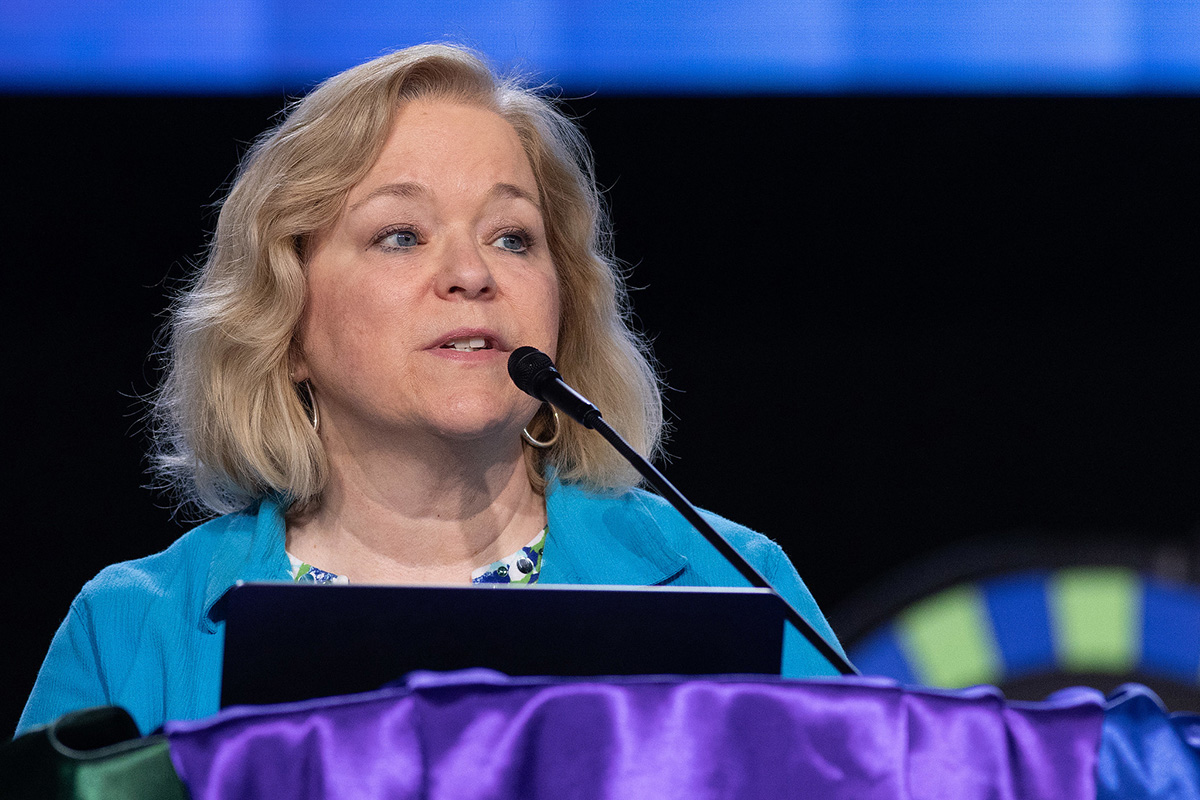Key points:
- The subject of missing delegates continues to surface at General Conference, underway through May 3 in Charlotte, North Carolina.
- The credentials committee reported that of 862 allocated delegates, 775 were confirmed as properly elected and 765 were participating in Charlotte, as of April 29.
- Concerns continue about African delegates’ underrepresentation at this General Conference.
- The chair of the credentials committee noted the challenges the Commission on General Conference faced in certifying that some African delegates had been properly elected.
With General Conference well into its second and final week, the topic of missing delegates — particularly from Africa — keeps surfacing.
Diane Brown, a Michigan Conference delegate, chairs the credentials committee and gave a report on delegate numbers during the April 29 afternoon plenary.
Brown verified that many delegate seats are empty but also spoke at length of the challenges facing the Commission on General Conference staff in verifying that some delegates were properly elected.
“It’s just so much complexity in what the office (of the Commission on General Conference) had to go through,” Brown told UM News on April 30.
Subscribe to our
e-newsletter
Brown said in her plenary report that of 862 allocated delegates, 775 were confirmed as properly elected. She said that, so far, 765 of those had made it to General Conference and were given badges to participate.
That means 97 of allocated delegates were missing from the Charlotte gathering, as of April 29.
While the U.S. is represented at nearly 100 percent, just 278 of 370 allocated delegates from the central conferences — church regions in Africa, Europe and the Philippines — are participating in this General Conference, Brown said. That is about 75 percent.
Ten delegates were still trying to get to Charlotte as of April 29, Brown said. The conference ends May 3.
Ahead of General Conference, different groups of African United Methodists warned that their continent would be seriously underrepresented.
Neither Brown’s credentials committee report nor an earlier one at General Conference, by Kim Simpson, chair of the Commission on General Conference, clarified how many African delegates were missing. The commission also did not do so in a press release issued just ahead of General Conference.
But the percentage of allocated delegates participating from Europe and the Philippines appears strong, leaving Africa as the conspicuously underrepresented area.
“What I’m hearing unofficially is 70-80 (absentee African delegates),” said the Rev. David Livingston, a Great Plains Conference delegate. “It’s a moving target as people keep arriving. At the end of General Conference, there will be at least 55 missing.”
The Rev. Forbes Matonga, a delegate from the Zimbabwe West Conference, agreed with Livingston, estimating the current number of African absentees at 70.
Every General Conference has missing delegates due to inability to get visas, illness, work conflicts or other reasons. Thirty to 40 absentees would not be unusual, said the Rev. Alan Morrison, a former business manager for General Conferences. At the 2012 General Conference in Tampa, Florida, the Committee on Credentials reported that 952 delegates out of an authorized 988 had “credential status.”
In her report to the plenary about the high absentee numbers in Charlotte, Brown noted that voting irregularities at the 2019 special General Conference in St. Louis required a more rigorous approach to verifying delegates had been properly elected. She described a range of challenges the Commission on General Conference staff had in getting the information it needed, including from secretaries of African conferences.
Brown said the staff also reported that the U.S. was rejecting visa requests at a higher-than-usual rate, affecting the number of delegates who could get to Charlotte.
“While it is disheartening that more delegates could not be present, it is with assurance that we believe this to be a legitimate and properly certified gathering of delegates,” she told the plenary.

General Conference photos
But Matonga is among those here who believe more could have been done to boost the number of African delegates in Charlotte.
“The excuses are far from satisfactory,” he said.
He is among those who have said the commission staff was late with letters of invitation necessary for delegates seeking visas. And, he said, the fact that General Conference was twice delayed by the COVID-19 pandemic should have helped the staff in making sure as many delegates as possible could be in Charlotte.
“What concerns us is we had ample time to prepare,” Matonga said. He added that close votes at General Conference might have gone the other way with more delegates in place.
Livingston noted that most votes at General Conference have been by large margins — beyond the number of absentees. But he, too, is concerned with preparations for this General Conference, and he moved early in its proceedings to require that the Rev. Gary Graves, secretary of the General Conference, prepare a report explaining “with clarity and full transparency” the discrepancy between the number of delegates allotted and the number participating in Charlotte.
Livingston’s motion — which called for information about why delegates faced delays in getting flight and housing information, as well as invitation letters for visas — was approved by a vote of 669 to 40.
Hodges is a Dallas-based writer for United Methodist News. Contact him at 615-742-5470 or [email protected]. To read more United Methodist news, subscribe to the free Daily or Weekly Digests.




